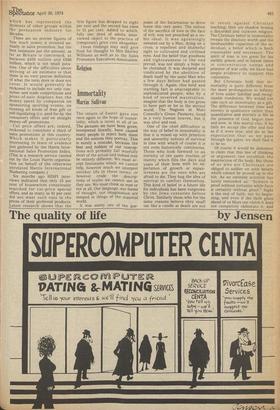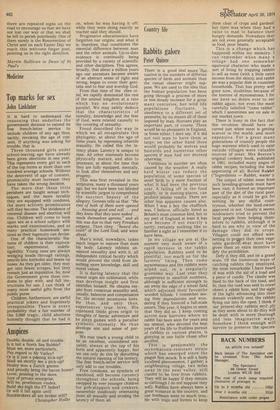Religion Immortality Martin Sullivan
The return of Easter gave rise once again to the hope of immortality, which is latent in all of us. The pictures we have been given, interpreted literally, have caused many people to reject both them and the notions they portray. This is surely a mistake, because the best and noblest of our conceptions will probably fall woefully short of the actual and indeed may be entirely different. We must accept limitations which we cannot help, however much we interpret another life in these terms, or however crude the descriptions of truths we cannot see as they are. We must think as men or not at all. Our language, our forms of thought, our imagination are steeped in things of the material world.
It was surely one of the pur poses of the Incarnation to drive home this very point. The notion of the sacrifice of love in the face of evil, was not preached as a noble ideal. It was agonisingly sweated out by a Man, dying on a cross, a repellent and shameful sight to cultivated and civilised eyes. And the belief that goodness and righteousness in the end prevail, was not simply a hope to be cherished. It was declared and vindicated by the abolition of death itself by the same Man who a few days before had passed through it. Again, this bold and startling fact is unacceptable to sophisticated people, who by a kind of inverted materialism, imagine that the body is too gross to have part or lot in the eternal world. The Negroes in Marc Connolly's Green Pastures, lived in a very human heaven, but it was alive and real.
One of the chief difficulties in the way of belief in immortality is that it is mixed up with primitive and unworthy notions of survival in time with which of course it is not even historically continuous. Those who look forward to an eternity of the same routine of inanity which fills the days and years of their lives with no expectation of growth or expan siveness are the ones who are afraid to die. They hug the idea of survival to comfort themselves.
This kind of belief in a future life for individuals has been outgrown by the Jews centuries before Christ. Similarly those who for the same reasons believe they snuff out like a candle at death are not
in revolt against Christian teaching; they are shadow boxing a discarded and outworn religion. The Christian belief in immortality reveals the absolute worth and the inexhaustible capacities of the individual, a belief which is both reasonable and necessary. The spirit of man is too great for his earthly prison and in recent times in concentration camps and prisoner of war cells, we have had ample evidence to support this contention.
But Christians hold that immortality is quite different from the mere prolongation to infinity of lives under familiar and recognisable conditions. We would not take such an immortality as a gift. The difference between time and eternity is qualitative rather than quantitative and eternity is life in the presence of God, begun here and now, in this mortal clay, if by faith we accept the offer and live as if it were true, and die in the expectation that as we pass through the gates, we shall find it to be so.
Of course it would be dishonest to claim that this line of thinking or argument can establish the resurrection of the body. But those of us who are Christians are obliged to soldier on with beliefs which cannot be proved up to the hilt. As an eminent scientist has lately reminded us: "Science is proof without certainty while faith is certainty without proof." Sight is the end of faith, not its beginning, and even if the dark glass ahead of us blurs our vision it does not completely obliterate it, and
there are repeated signs on the road to encourage us that we have not lost our way or that we shall be left to perish pointlessly. One of them surely is the Resurrection of Christ and on each Easter Day we reach this welcome finger post, pointing us in the right direction.
Martin Sullivan is Dean of St Paul's



































 Previous page
Previous page